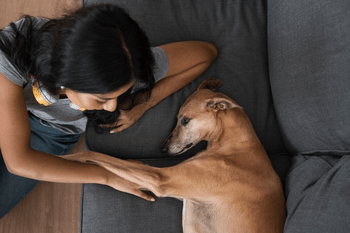
What do all the pawrents want, if not spending every minute they can get to spend with their little pooches?
While spending even a minute away from the little babies is difficult, for owners with puppies that face separation anxiety, it is a living hell!
If you feel the same, worry not; you are not alone. According to a survey done, about 44% of the participants (pet owners) shared their concerns about their pets facing separation anxiety!
Are you one such parent looking to make it better for your pooch? Here’s a moment of relief because we have got you covered.
Among different solutions (like interactive games), puppy behaviour training is among the most reliable and trustworthy ways to provide a solution to you.
Want to know more about how it can be helpful? Keep reading more:
Understanding Separation Anxiety in Puppies
Before understanding how helpful puppy training programs are, it’s essential to understand what separation anxiety is all about!
Separation anxiety is a condition characterized by excessive distress or agitation when a dog is separated from their owner or left alone.
Symptoms may include incessant barking, destructive chewing, urination or defecation indoors, and attempts to escape confinement.
While it’s normal for puppies to experience some degree of distress when left alone, separation anxiety goes beyond typical puppy behaviour and can significantly impact the pup’s well-being.
The Role of Puppy Training Programs
Dog behaviour training encompasses a range of techniques and methods designed to teach puppies appropriate behaviour and socialization skills.
These programs often focus on obedience training, teaching commands such as sit, stay, and come and addressing common behavioural issues like jumping, chewing, and leash pulling.
While the primary goal of puppy training programs is to instill good manners and obedience, they can also play a role in addressing separation anxiety.
-
Building Confidence and Independence
One of the critical ways puppy training programs can help with separation anxiety is by building confidence and independence in the puppy.
Through positive reinforcement techniques and structured training exercises, puppies learn to feel more secure and self-assured, even when left alone.
Training programs incorporating desensitization and counterconditioning techniques can gradually acclimate puppies to being alone for short periods, reducing anxiety and promoting independence.
-
Establishing a Routine
Consistency and routine are crucial components of managing separation anxiety in puppies.
Puppy training programs often emphasize the importance of establishing a predictable schedule for feeding, potty breaks, playtime, and rest.
By creating a structured routine, puppies learn to anticipate and adapt to periods of separation more effectively, reducing anxiety and promoting a sense of security.
-
Teaching Relaxation Techniques
Many puppy training programs incorporate relaxation techniques to help puppies cope with stress and anxiety.
These may include teaching puppies to settle on a mat or bed, practicing calm behaviours such as lying down or sitting quietly, and using soothing cues or commands to promote relaxation.
By teaching puppies to associate relaxation with positive experiences, training programs can help alleviate separation anxiety and promote emotional well-being.
-
Addressing Undesirable Behaviors
In addition to promoting positive behaviours, puppy training programs also address undesirable behaviours that may contribute to separation anxiety.
For example, programs may teach puppies alternative outlets for chewing and digging, redirecting their energy toward appropriate toys and activities.
By addressing underlying behavioural issues, training programs can help prevent the development or exacerbation of separation anxiety in puppies.
-
Socialization and Enrichment
Socialization and enrichment are vital aspects of puppy development and can play a significant role in preventing separation anxiety.
Programs for puppy behaviour training often include socialization exercises that expose puppies to new people, animals, environments, and experiences in a positive and controlled manner.
Additionally, programs may incorporate enrichment activities such as puzzle toys, interactive games, and sensory stimulation to keep puppies mentally and physically engaged.
By providing puppies with opportunities for socialization and enrichment, training programs can help build confidence, resilience, and coping skills, reducing the likelihood of separation anxiety.
Conclusion
Separation anxiety in puppies is undoubtedly stressful, affecting not only the pup’s well-being but also the emotional state of their caregivers.
So, to all the pawrents striving to make life better for their little pooches, take comfort in knowing that help is available. By the role of puppy behaviour training can ensure your pet learns to cope with being alone.
